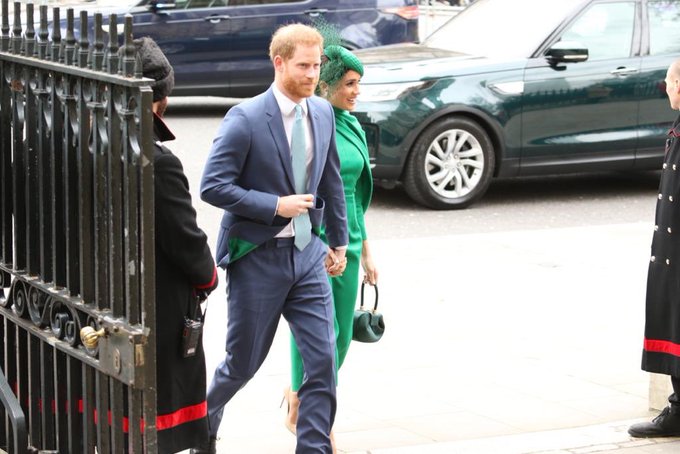 The Duke and Duchess of Sussex at their last major royal engagement on Commonwealth Day in March . [photo: Westminster Abbey]
The Duke and Duchess of Sussex at their last major royal engagement on Commonwealth Day in March . [photo: Westminster Abbey]
[This is an excerpt from an article appearing in The Round Table: The Commonwealth Journal of International Affairs. Opinion pieces do not reflect the position of the Round Table Editorial Board.]
So, with the retirement to North America of the Duke and Duchess of Sussex from their royal and Commonwealth duties, the brief experiment of a Commonwealth Youth Ambassador appears to have ended. Except that, under the radar and attuned to the IT of rising generations, a Commonwealth Youth Peace Ambassadors Network continues to flourish.
With 60% of the Commonwealth’s people under 30, the role of a Commonwealth Youth Ambassador could be a full-time job. It is not clear how much consultation with governments preceded the Buckingham Palace announcement, in April 2018 prior to the London summit, that Prince Harry was taking this on. There has never been a Commonwealth Youth Ambassador before and, though Prince Charles as Acting Head of the Commonwealth plans to visit every member state, there seem no plans to replace Harry. No terms of reference for him were announced. The situation was markedly different from that of a Unicef Goodwill Ambassador, for example, where the duties are defined by letters of agreement.
In fact, the duke appears to have carried out only one duty in conjunction with the Commonwealth Secretariat – in presenting Commonwealth Youth Awards – though he did not then make a speech. He was, in parallel, presiding over the new Queen’s Commonwealth Trust, and his wife became a patron of the Association of Commonwealth Universities. When it looked as though the duke might carry on Commonwealth assignments from Canada, home of the respected Commonwealth of Learning which promotes distance education, many were delighted. There is a perennial critique that the multilateral organisation is too British-focused and too exposed to UK influence. A proposal in the 1990s for the relocation of its Secretariat to a developing country, in a report from the Royal Commonwealth Society and Foreign Policy Centre, was swiftly killed. A fresh initiative, based closer to the Caribbean and Pacific, would have changed perceptions.
But the short life of the position of Commonwealth Youth Ambassador casts an overdue light on the under-publicised work of Commonwealth Youth Peace Ambassadors. This largely online network has a distant ancestry in the path-breaking Nkabom youth project of the Royal Commonwealth Society in Ghana and the 2007 Amartya Sen report on ‘Civil Paths to Peace’. It was born at a Rwanda workshop, supported by the Commonwealth Youth Programme and the Institute of Strategic Dialogue, and achieved lift-off in 2015 at a Commonwealth youth conference.
A glance at the CYPAN website makes clear that the Youth Peace Ambassadors, in reality, organisations as much as individuals, are working in some of the toughest parts of the world – peace-building, countering violence and extreme radicalisation, and ensuring that young people are taken into account by governments, so that their futures not destroyed. The current coordinator is a Cameroonian, Christian Acheleke, and he explains that his own organisation, Local Youth Corner Cameroon, has been involved in trying to make peace in the low-level civil war in Anglophone Cameroon and repairing the depredations of Boko Haram.
Richard Bourne is a member of the Round Table Editorial Board.



